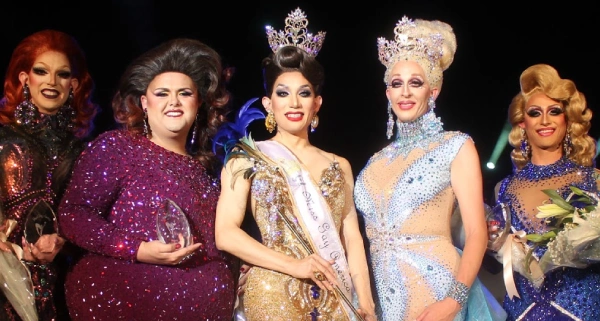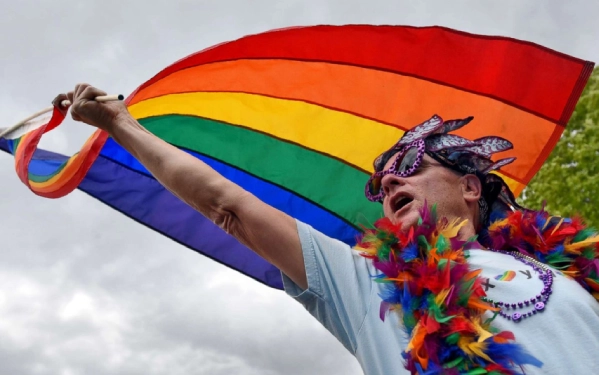
- › Defining LGBT Friendly: What does it mean to be LGBT friendly?
- › Importance of LGBT Friendly Businesses: Why is it important for businesses to be LGBT friendly?
- › Creating an Inclusive Workplace: Tips for creating an inclusive workplace for LGBT employees
- › Marketing to the LGBT Community: How to effectively market to the LGBT community
"LGBT friendly" refers to a person, organization, or place that is welcoming and accepting of individuals who identify as lesbian, gay, bisexual, or transgender. It means that the person, organization, or place does not discriminate against individuals based on their sexual orientation or gender identity, and supports equal rights, opportunities, and respect for the LGBT community. It is important for individuals to feel safe and accepted in their environment, and being LGBT friendly is a step towards creating a more inclusive and diverse society.
Defining LGBT Friendly: What does it mean to be LGBT friendly?
Being LGBT friendly means that an individual or organization is accepting, supportive, and inclusive of all members of the LGBT community. This includes lesbian, gay, bisexual, and transgender individuals, as well as those who identify as queer, intersex, asexual, or any other non-heterosexual or non-cisgender identity.
To be LGBT friendly, it's important to create a safe and welcoming environment where individuals can express themselves without fear of discrimination or judgment. This can be achieved by using gender-neutral language, displaying inclusive signage, and providing gender-neutral restrooms.
It's also important to educate oneself on LGBT issues and to actively work towards creating a more equitable society for all. This may involve advocating for LGBT rights, supporting LGBT-owned businesses, and creating inclusive policies in the workplace.
But being LGBT friendly goes beyond just the surface level. It means actively listening to the experiences and needs of LGBT individuals and taking action to address any barriers or challenges they may face. By doing so, we can create a world where everyone feels valued and respected, regardless of their sexual orientation or gender identity.
Importance of LGBT Friendly Businesses: Why is it important for businesses to be LGBT friendly?
It is important for businesses to be LGBT friendly because it is a matter of basic human rights and equality. By being inclusive and accepting of all individuals, regardless of sexual orientation or gender identity, businesses can create a welcoming environment for everyone. This can help to attract a diverse customer base and build customer loyalty.
Moreover, being LGBT friendly can also benefit businesses financially. According to a study by Community Marketing & Insights, the buying power of the LGBT community in the United States alone was estimated to be $917 billion in 2015. By creating a safe and welcoming environment for LGBT customers, businesses can tap into this market and increase their profits.
In addition, being LGBT friendly can also attract and retain talented employees. LGBT individuals often seek out workplaces that are inclusive and accepting of their identities, and businesses that provide such an environment can attract and retain a diverse group of employees.
Overall, being LGBT friendly is not only the right thing to do, but it can also benefit businesses in numerous ways. By creating a welcoming environment for all individuals, businesses can increase their customer base, profits, and employee satisfaction.
Creating an Inclusive Workplace: Tips for creating an inclusive workplace for LGBT employees
Creating an inclusive workplace is not only the right thing to do, but it can also lead to increased productivity, job satisfaction, and retention rates for your LGBT employees. Here are some tips for creating an inclusive workplace for LGBT employees:
- Educate yourself and your employees about LGBT issues: Make sure that everyone in your workplace understands the challenges and discrimination that LGBT individuals face. Encourage open dialogue and provide resources for employees to learn more about LGBT issues.
- Create a non-discrimination policy: Make sure that your company's policies explicitly prohibit discrimination based on sexual orientation and gender identity. This sends a clear message that your workplace is inclusive and welcoming to all employees.
- Offer benefits for same-sex partners: If your company offers benefits like health insurance or retirement plans, make sure that they are available to same-sex partners of employees. This shows that your company values all types of families.
- Use inclusive language: Make sure that your company's language is inclusive of all genders and sexual orientations. For example, instead of using "he" or "she" pronouns, use gender-neutral pronouns like "they."
- Celebrate LGBT events: Celebrate LGBT events like Pride Month or National Coming Out Day. This shows that your company supports and values your LGBT employees.
By creating an inclusive workplace, you can attract and retain top LGBT talent and create a more productive and happy workplace for all employees.
Marketing to the LGBT Community: How to effectively market to the LGBT community
Marketing to the LGBT community can be a great way to show your support for diversity and inclusion, while also attracting a valuable and loyal customer base. However, it's important to approach this market with sensitivity and authenticity, rather than just trying to capitalize on a trend.
The first step to effectively marketing to the LGBT community is to do your research. Understand the unique needs, interests, and challenges of this demographic, and tailor your messaging and marketing strategies accordingly. This might involve using inclusive language and imagery, showcasing diverse representation in your advertising, or partnering with LGBT organizations or influencers.
Another key aspect of marketing to the LGBT community is to be transparent and genuine in your approach. This means not just paying lip service to diversity and inclusion, but actively demonstrating your commitment through your actions and policies. For example, you might offer gender-neutral restrooms, sponsor LGBT events or charities, or have LGBT employees in visible leadership roles.
Finally, it's important to recognize that the LGBT community is not a monolith. There are many different subgroups within this demographic, each with their own unique needs and preferences. By taking the time to understand and cater to these diverse perspectives, you can create a truly inclusive and effective marketing strategy that resonates with your LGBT customers.







